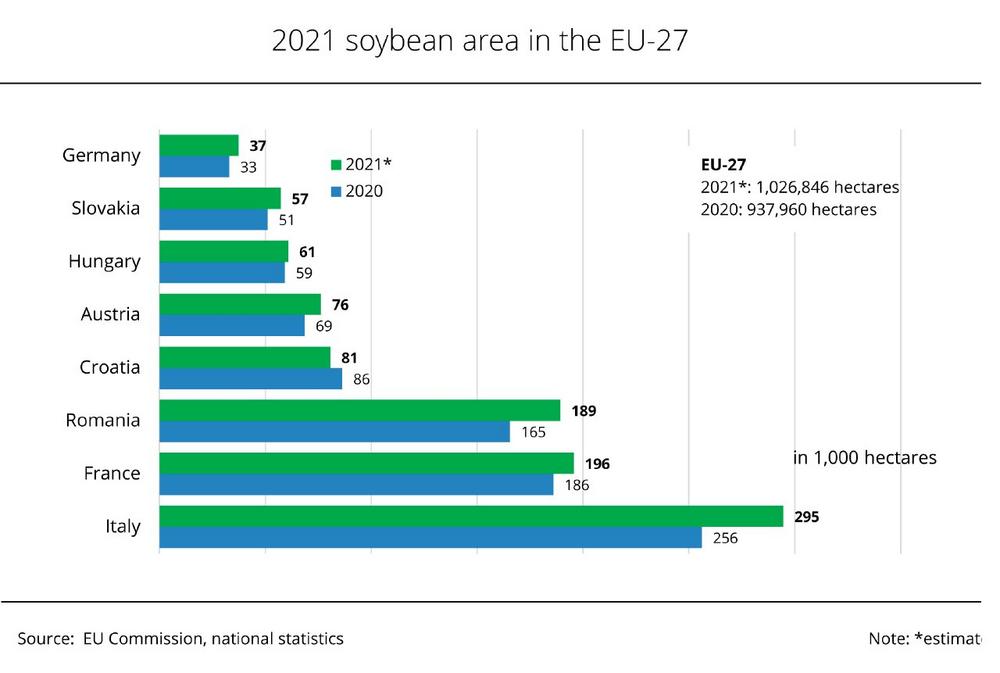According to EU Commission estimates, the soybean production area in the EU-27 for harvest in 2021 for the first time exceeds 1 million hectares. With an increase of 9.5 per cent on the year and just about 12 per cent on the long-term average, it has reached a new record level. In other words, the EU soybean area has tripled in 12 years. Italy has taken the lead in this development with an estimated production area of 295,000 hectares and a strong increase of 15 per cent over the previous year. France ranks second with 196,000 hectares and a comparatively lower expansion of 5 per cent. Romania is also growing significantly more soybeans, having expanded the area 14 per cent to 189,000 hectares. Germany ranks eighth in the EU comparison with 37,000 hectares of soybean area, but has also seen a strong expansion in area of 14 per cent.
The Union zur Förderung von Oel- und Proteinpflanzen (UFOP) e. V. has welcomed this positive development as a result of continuously growing demand for GM-free soybean meal in all animal husbandry sectors. Soy is also used as a source of protein in the food market for a steadily expanding range of products. Rising demand due to product innovations can also be observed in field beans, peas and lupins. According to UFOP, this trend is basically positive. However, comparing the protein strategies in Germany and France, the association sees a clear need to improve implementation in Germany. UFOP has said that the German protein plant strategy lacks specific targets to serve as "drivers". France provides massive support to research in breeding. This alleviates the cost pressure on seed.
Referring to the double-zero strategy for rapeseed in the early 1990s, the UFOP has stated that to date, this strategy is a successful example of increasing added value at the producer level by providing market access to the food, biodiesel and feedstuff sectors. Also, at the time more plant breeders entered the market, which in turn expedited breeding progress. The UFOP has emphasised that a lot of staying power is needed, as are integrated and comprehensive approaches with a sound funding environment in all areas of the economy. Such value chain can serve to make the integrated bioeconomy visible and also highlight the ecosystem services provided by the rotation systems expanded to include these crops. The networks funded by the BMEL have contributed to laying the foundations over the past years. UFOP has emphasised that in the interests of climate protection this process should be moved forward faster.
The Union for the Promotion of Oil and Protein Plants e. V. (UFOP) represents the political interests of companies, associations and institutions involved in the production, processing and marketing of domestic oil and protein plants in national and international bodies. UFOP supports research to optimise agricultural production and for the development of new recycling opportunities in the food, non-food and feed sectors. UFOP public relations aim to promote the marketing of domestic oil and protein plant end products.
UFOP – Union zur Förderung von Oel- und Proteinpflanzen e.V.
Claire-Waldoff-Str. 7
10117 Berlin
Telefon: +49 (30) 2359799-40
Telefax: +49 (30) 2359799-99
http://www.ufop.de
Telefon: +49 (30) 31904-225
E-Mail: s.arens@ufop.de
Sekretariat
Telefon: +49 (30) 31904-486
Fax: +49 (30) 31904-485
E-Mail: s.reder@ufop.de
![]()
